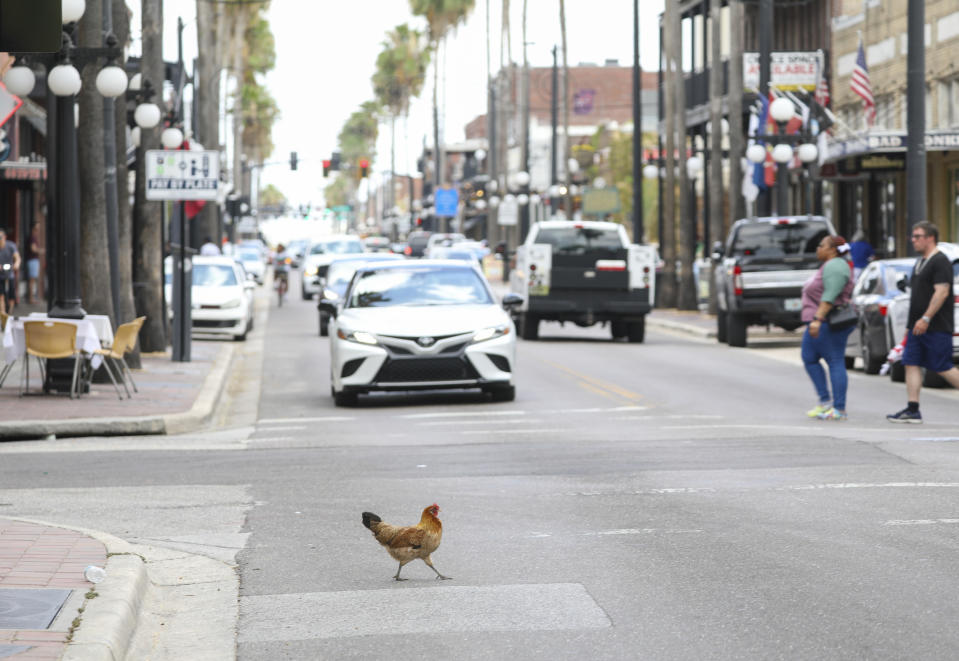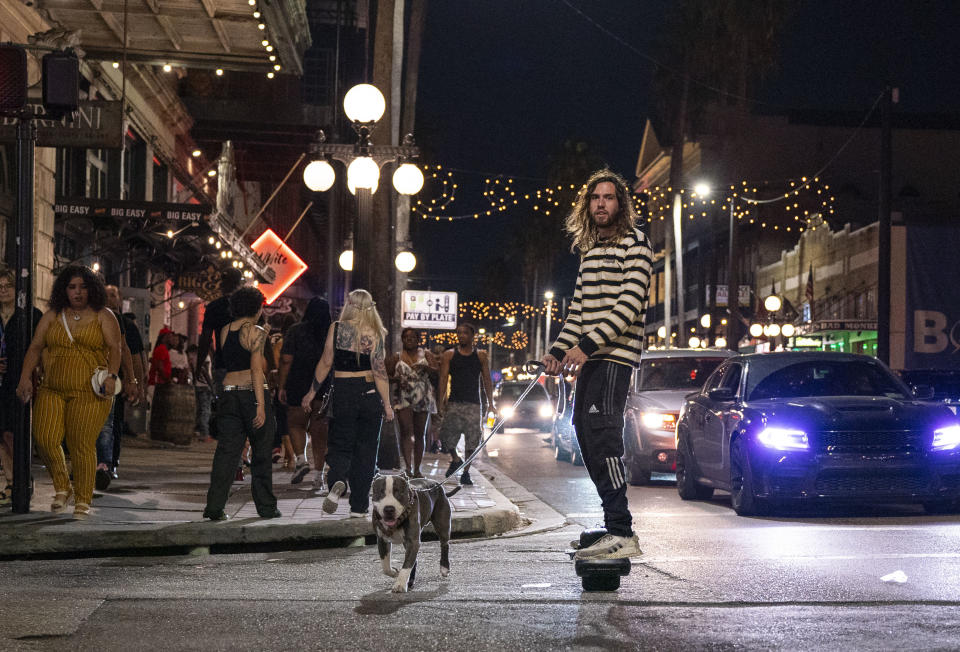For boozy Ybor City, pickleball and cheesemaking? Get ready for what’s next
Dysfunctional Grace is the kind of shop tourists wander into on a stroll through Ybor City.
The business on Seventh Avenue, the entertainment strip with its historic brick buildings and strutting free-range chickens, could be described as a curiosity shop: taxidermied animals, old photos, some skulls — “the only shop in Ybor where death and dysfunction dance in a graceful ballet” says its website. It’s odd, eclectic, very Ybor.
Now, with up to 5,000 new residences coming over the next 10 years via developer Darryl Shaw, Ybor is readying for its next incarnation. And it’s one already sparking a mix of reactions — hope for new business and growth, combined with worry that Ybor might lose its funky edge and locals could get priced out.
What’s coming? Think indoor pickleball. Think of a place where customers sip wine while learning to make cheese, or one where they concoct chocolate — a different vibe from Ybor’s well-known bars and clubs.
What does Dysfunctional Grace co-owner Liz Furlong think about the coming influx bringing in things to do besides bars? People, she said, are good for Ybor.
“One hundred percent,” said Furlong. “Yes, please.”
Settled by Spanish, Cuban and Italian immigrants, Tampa’s Latin Quarter has had many faces: a thriving community built on a fabric of cultures, the epicenter of Tampa’s cigar industry, a haven for artists, and once, a place that, to the horror of some Ybor purists, housed mall mainstays Victoria’s Secret and Urban Outfitters.
These days Ybor is a popular spot to lunch and dine, for visitors to wander before the bar-and-club crowd settles in for the night. Homeless people panhandle in the busy foot traffic and sleep along its streets after the bars shut down. Ybor also has a tight-knit residential community.
As part of the Gas Worx project that will connect Ybor to downtown and the upscale new Water Street community, Shaw is already beginning to add those residences, along with 500,000 square feet of office space and 140,000 in retail. He says he and others are “actively involved and focused” on Ybor’s future.
“I think there is definitely a desire to temper some of the late-night activity,” Shaw recently told the Tampa Bay Times.
Shaw, who retired last year from the BluePearl veterinary business he co-founded, said Ybor still has a strategic advantage to being known as an entertainment district.
“I think there is definitely a place for bars and clubs,” he said. “But right now it’s too heavily weighted in that direction and not enough on restaurants, arts and retail.” Shaw wants more to do in Ybor. The aforementioned cheese and chocolate ventures are expected to open at his properties.
Asked by a Times reporter last year how many of Ybor’s approximately 600 acres he has ownership interest in, Shaw said he hadn’t calculated, but thought it was about 100.
“We’ve got several really good restaurateurs that are on the fence about Ybor … ‘Is now the right time?’” he said they’re thinking. “We’re looking for one or two of those dominoes to fall, and then I think it’s all in.”
Some current residents worry that development in and around Ybor could ultimately mean one day being priced out by higher rents.
“I think the more the merrier,” said Susan Devore, a yoga instructor who works at an Ybor wine bar and lives with her partner, a tattoo artist. “As long as we can stay.”
Jeff Ballard, manager of an Ybor comedy club, was walking his dogs, Nicko and Lennie, past Ybor’s newly opened dog park by the new bagel shop. He echoed the concern: “I could imagine it’s going to make it unaffordable for a lot of people who live here.”
At a recent business event in Tampa, Shaw told the crowd that 10% of what he is building will be affordable housing for service industry people and those with lower-wage jobs, which was not required by the city.
Ybor resident Joe Howden came to the neighborhood as an artist decades ago and got deeply involved in various boards and causes. He lives in a historic casita with a front porch and a mango tree. These days he gives history tours.
“The place is full of empty land leftover mostly by urban renewal in the 60s,” Howden said. “That land is going to get developed. That’s going to happen well or it’s going to happen poorly. I would like to have it happen well.” He said he’s a fan of Shaw and what he’s done so far.
Shaw donated Ybor land for a project called Artspace Tampa that will offer affordable space for artists to live and work. In the historic Kress building Shaw owns, galleries, literary groups, a cinema and the offices of the Tampa City Ballet have formed a collective on the second floor. The Florida Museum of Photographic Arts is expected to occupy the ground floor.
Chris Wojtowicz, who lived in suburban New Tampa before he moved to Ybor City in 2016, agrees the area has plenty of available space to accommodate new business. He also sees “some validity” to the idea that there’s not much to do during the day.
“But there’s also a culture ... kind of, keep Ybor weird,” he said. Dive bars, tattoo parlors, piercings, night clubs and such are part of the vibe, he said. “So it’s a balance.” He wouldn’t like to see Ybor become “the new New Tampa,” he said.
“Bringing people to the area, it’s great for the restaurants and people like us,” said Ben Wax, general manager at La France, the vintage clothing and accessories shop that has thrived in Ybor for nearly half a century. “As long as it’s done with intent. It’s not: How many people can we cram into this place?”
While Ybor has a selection of tattoo shops, there is no grocery store. New residences could bring in neighborhood amenities such as dry cleaners, drug stores, veterinarians, day cares and nail salons. But it’s a grocery that seems to top current residents’ wish lists — though some said they would prefer a mom-and-pop to a supermarket.
It’s a common refrain here that chains and big box businesses don’t belong in Ybor.
Furlong at Dysfunctional Grace doesn’t want Ybor to lose its small business feel, nor its “grunginess.”
“I don’t want to see an Apple store,” she said. “I want corporate to stay away from Ybor.”
But she said she’s encouraged by Shaw’s support of the arts and loves the idea of new residents.
“That’s what we need. We need people,” she said.
As for Cheeseology, the cheese-making enterprise?
“Well, why not?” Wojtowicz said. “The thing about Ybor City that makes it awesome is variety. The great thing is we live in a capitalist society where it can live or die on its merit.”
Shaw says these days he sees more people walking dogs and more women out for a solo run in Ybor. Pickleball, a sport trending high, is coming to a 70-year-old warehouse in his Gas Worx project.
Shaw says he wants Ybor to be “one of America’s great neighborhoods.”
“We’re confident we can do it,” he said.




